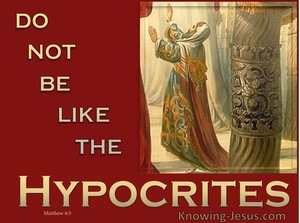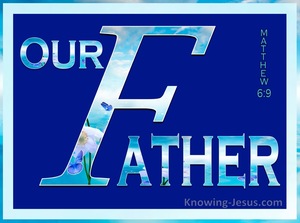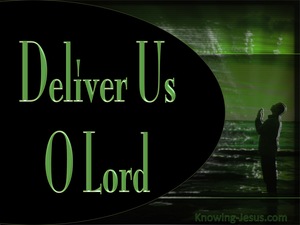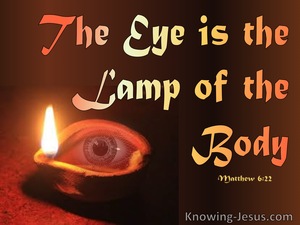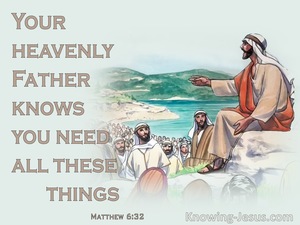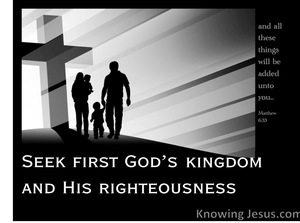◄ Matthew 6 Devotional Commentary ►
Matthew 6:1
Much of Christ's Sermon on the Mount was on the righteousness behaviour that God expects and demands from those who by faith in God have become His children, by faith.
Jesus did not say that we would become children of God by exhibiting righteous behaviour, for by righteous works of the flesh shall no man living be justified. Rather He was teaching that godly behaviour and righteous deeds would read more...
Matthew 6:5
As one reads through Christ's Sermon on the Mount, it can be noticed, from start to finish, that it follows a very logical sequence where one topic flows coherently into the next.
Just as Moses laid out God's law to Israel on Mount Sinai, so we find Jesus, Israel's anointed King, presenting a comprehensive constitution of His coming kingdom which delivers a synopsis of His character and conduct - His mission and mentality.
read more...
Matthew 6:6
Prayer is one of the most vital and special prerogatives that Christians have been afforded in this Church age. Through the blood of Christ, Christians in this dispensation of Grace have been given access into the throne-room of God, and as His children, we have been given the right to draw near to Him with boldness so that we may receive mercy and find grace for help in times of need.
The only way for a man to approach God before read more...
Matthew 6:9
The Father of glory resides in heaven and His name is to be hallowed, treated with reverence, and set apart from all others. God began to unveil Himself to His creation in the beginning. As time passed, this revealing of Himself to man often came through the many names that He called Himself - each one disclosing one more beautiful facet of the immortal, invisible, only wise God of grace.
Hallowed be His name.
read more...
Matthew 6:9
There was something unique and so very special about the prayer-life of our Lord that it caused his disciples to ask, "Teach us to pray." They did not ask to be taught to teach or to preach, to heal, or to change water into wine, but their desire was to pray as Christ prayed, and so they came to Him and said, "Lord, teach us to pray."
Christ did not give them a 5-point lesson on the art of read more...
Matthew 6:11
The quiet, unassuming prayer life of the Lord Jesus was very different from the showy pomposity of Israel's religious leaders, whose presumptuous prayers were designed for the ears of other people and were not offered to our Father in heaven.
The intimate prayer life of the Lord Jesus with His Heavenly Father, was very different from anything the world had ever witnessed before. No wonder, therefore, that Luke's Gospel records read more...
Matthew 6:12
Jesus made some blistering criticisms of the hypocritical Pharisees of His day. They liked to flaunt their 'righteous' deeds and often made a great public performance of their prayers. Their proud hearts were not broken by sin and their long, repetitive invocations were insincere. Their prayers were not directed to God, but were turned into a drama for the benefit of passers-by.
Jesus condemned their vain, repetitive prayers and read more...
Matthew 6:13
When we pray we are called to be sincere in our prayers and to pray into the will of God, for He will not answer insincere or selfish prayers that conflict with His nature and will.
The pattern of prayer that Jesus taught His disciples, was to demonstrate that we should reverence Him as our Father in heaven, glorify His holy name, and pray into His perfect plan, His heavenly purpose, and His eternal will.
read more...
Matthew 6:19
The Lord Jesus knows: "The human heart is deceitful above all things and desperately wicked," and that an attitude of materialistic, money-orientated consumerism will degenerate into greed, covetousness, double-mindedness, and a divided heart, for we cannot serve mammon and God at the same time. Love of money and love for God cannot co-exist; one or the other will always reign supreme in the heart of man.
But the Lord read more...
Matthew 6:20
A right attitude towards wealth and material possessions is a mark of spirituality. However, when a wrong attitude starts to develop, it gives birth to a range of ungodly motives and behaviours.
Materialism can enslave the heart, entrap the mind, subjugate the soul, and suppress the will of a believer. And when a man or woman elevates earthly possessions above their heavenly investments, they become shackled to the temporal read more...
Matthew 6:21
How important that we hold this world's wealth and wisdom, together with position and power very lightly, for what we treasure in our hearts will become that which we worship.
We brought nothing into this world and will take nothing out of it, and yet too often we spend the majority of our time accumulating unimportant things and glorifying in the gaudy trinkets of this temporal world, at the expense of storing up a heavenly read more...
Matthew 6:22
The entire Mosaic Law was given to Israel through Moses, and its essence is encapsulated within the 10 commandments. Keeping the Law did not save a person but was designed to show a man his sinfulness - with the intention of driving sinners to God for His gracious salvation which would be procured through the blood of the New Covenant.
God took one small segment of all humanity (the nation of Israel) and tested them to see if read more...
Matthew 6:24
Too often, a demarcation line is laid between the material things in life and the spiritual things of God; between what we say and do in our Christian life, and what takes place during the rest of the time. This is often reflected in our attitude towards our material possessions. Ones attitude towards wealth is a good indicator of ones virtue, and ones perspective on the material is a legitimate barometer of a man's spirituality.
read more...
Matthew 6:25
It is one thing to believe on the Lord Jesus Christ for salvation, but it is another thing become a disciple, take up one's cross daily, and die to self as we live for Him. The Sermon on the Mount makes it very clear to both Israel and the Church, that true discipleship demands true righteousness which is not produced by works of the Law but by faith in Christ.
The Sermon on the Mount was delivered to rectify Israel's incorrect read more...
Matthew 6:26
This is a verse about the foolishness of worry and the faithfulness of God as our gracious Provider, but too often we worry about the things in this life. We can be anxious about the future and we can fret about the past. We can worry about our finances, our families, and our futures, our reputation, and our relationships, and yet the Lord points out the futility of worry – for if He provides for the little birds, how much more will He provide for those that are read more...
Matthew 6:29
When the Lord tried to get His point across to the disciples (and to us), He often did it in the simplest of terms with the use of unimportant, everyday, mundane things. What is more insignificant than a little wayside flower or the grass of the field, and yet Christ used a simple wild lily to demonstrate the gracious care and loving concern our heavenly Father has for each of His blood-bought children.
Jesus challenged His read more...
Matthew 6:30
The eternal Son of God came to earth as the perfect Son of Man to fulfil prophecy, set up His kingdom on earth, and sit on the throne of David. Matthew is the Gospel that places its foremost focus on the kingship of Christ. He opens with the genealogy of the Lord Jesus through David and Abraham, which confirms His royal qualification. And as we take a peep into His birth and early childhood, we are presented with many prophecies to authenticate His Messianic read more...
Matthew 6:31
How easy it is to start to worry about the necessities of life and to become anxious when we see that food is getting scarce, clothing is getting worn, the rent is overdue, or when we have to face the loss of a job or a home.
All such things are considered to be the basic needs and necessities of life, and how easy it is to find our heart racing and our minds spinning when we lack the basics that sustain our mortal life. But read more...
Matthew 6:32
Christ's Sermon of the Mount is not a treatise on how to be saved, for we are saved by grace through faith in His finished work at Calvary. His teaching deals with the deeper, spiritual implications of Christ's authority over the lives of those who would believe in Him. The Jewish perception of the Messiah was a man who would come to defeat their Roman overlords in the physical realm and establish peace and plenty for all. The Jews of read more...
Matthew 6:33
Not one word in Scripture is superfluous and when the word BUT starts a sentence, it is a conjunction of contrast - it is a word that introduces an opposite outcome and is a clue that the upcoming statement is about to qualify something important. Having taught His disciples to pray to the Father in faith, Christ gives a long dissertation on the futility of fretting, the fruitlessness of worry, and the anxiety that is caused when our primary attention is read more...

